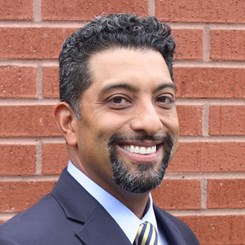Kenneth Persaud, M.D., CEO of Visualize Health, a Sharecare Company, and a member of the RISE Association Advisory Executive Committee, talks to RISE about the impact COVID-19 may have on value-based care, accountable care organizations, and telehealth.

The COVID-19 pandemic has not only threatened the health of millions of people across the globe and the economy. There is another potential victim: Value-based care.
Indeed, more than half of health care organizations that participate in the risk-based Medicare Accountable Care Organization program may drop out of the program to avoid payment of massive financial losses to cover the cost of the deadly coronavirus outbreak according to a new survey from The National Association of Accountable Care Organizations (NAACOS).
RELATED: COVID-19 may force more than half of ACOs to drop out of Medicare Shared Savings Program
NAACOS, along with nine other health care organizations, have urged federal lawmakers to shield participants in ACOs and other value-based payment models from financial penalties because of costs incurred responding to the pandemic. Because ACOs are judged against their spending from previous years, NAACOS said they could spend well more than their pre-determined spending targets in 2020 as they see spikes in hospitalizations and prolonged intensive care stays of their ACO patients because of COVID-19.
 The outbreak has completely upended medical practices and could wipe out any savings that providers who participate in ACOs have made, says Kenneth Persaud, M.D., CEO of Visualize Health, a Sharecare Company, and a member of the RISE Association Advisory Executive Committee (pictured right). Also, in danger: the strides ACOs have made in value-based care for the nearly 12 million beneficiaries enrolled in the Medicare Shared Savings Program (MSSP) program.
The outbreak has completely upended medical practices and could wipe out any savings that providers who participate in ACOs have made, says Kenneth Persaud, M.D., CEO of Visualize Health, a Sharecare Company, and a member of the RISE Association Advisory Executive Committee (pictured right). Also, in danger: the strides ACOs have made in value-based care for the nearly 12 million beneficiaries enrolled in the Medicare Shared Savings Program (MSSP) program.
Many of the 580+ ACOs have generated savings to achieve improved quality and reduced costs. But even in cases in which ACOs are below the threshold to receive shared savings payments, Persaud said that physicians in those organizations have invested dollars and practice resources toward improving the health of their patients and they do not view it as a failure if the ACO leads to high-quality grades for their patients. “That’s a win for the practice and communities they serve,” he said, adding that practices want to continue in a program transitioning to a value-based model even if they are not receiving payments.
Managing medical practices during COVID-19
But COVID-19 has placed a tremendous amount of stress on practices that aim to keep patients out of the hospital. Medicare beneficiaries are the highest risk demographic for poor outcomes in the event they come down with COVID-19. To reduce the risk of spreading the virus, practices have had to cancel as much as 95 percent of their visits to avoid patients coming to the office. The revenue losses and volume reductions couldn’t come at a worse time, he said. “At a practice level, they are trying to manage through the crisis but have fixed overhead costs. We’ve seen as much as a 40 to 50 percent reduction in staffing and that translates directly into ACO business. All elective procedures have been canceled to avoid treating patients in the inpatient environment. It’s been devastating for practices,” he said.
In order to make payroll and keep providers employed, practices may have to rethink their business model and cut fixed costs to perform data analytics as well as staff that provide care coordination services.
The problem is compounded because this is the last year of the MSSP and as of January 1, 2021, all ACOs will have to take on some element of downside risk and be held financially accountable for losses. “Some ACOs are thinking whether it financially makes sense to join a new ACO program in 2021. Most have been sidelined so unless CMS provides relief in the form of a financial carve out for catastrophic COVID-19 related costs in those geographies with high numbers of cases, I don’t see how physicians can move forward,” he said.
To avoid losing ground and the number of ACO’s moving forward into 2021 and beyond, Persaud hopes the Centers for Medicare & Medicaid Services (CMS) will provide announcements of relief soon, so the programs will not be penalized for outcomes of COVID-19 that they cannot control.
Telehealth offers a lifeline post-COVID-19
Persaud said that he is encouraged, however, that CMS has expanded telehealth benefits on an emergency basis due to the outbreak. “This was a phenomenal announcement and we are supporting our practices to adopt these visits which enable them to manage their patient during the pandemic and will help practice emerge post-crisis,” he said.
RELATED: Medicare Advantage plans can offer additional telehealth benefits in 2020
Telehealth, he said, may be the silver lining for health care delivery in the future and may allow providers to reach patients who may not have sought out care in the past. Most of the population has smart phones and are tech savvy. Social distancing has led many seniors to learn how to video chat with their grandchildren. All these factors will help patients be more comfortable with telehealth visits, even after the country relaxes social distancing and people start to go back to work in offices.
Until now, insurance companies have not typically paid for these types of visits. The approval from Medicare to allow practices to interact via telemedicine with their patients during social distancing is a huge development. The problem is not a lot of companies provide secure technology to allow providers to have a meaningful exchange with patients via video and photographs.
“It’s absolutely critical that we start to leverage new capabilities and technologies and help practices emerge in the post-Covid, post-shut down period,” he said.
Editor’s note: For more information on the latest CMS developments, visit the CMS Newsroom. The site contains notices about changes to telehealth, MSSP ACOs, Medicare Advantage payment rates, Medicare Advantage billing guidance, and summaries of recent actions.
